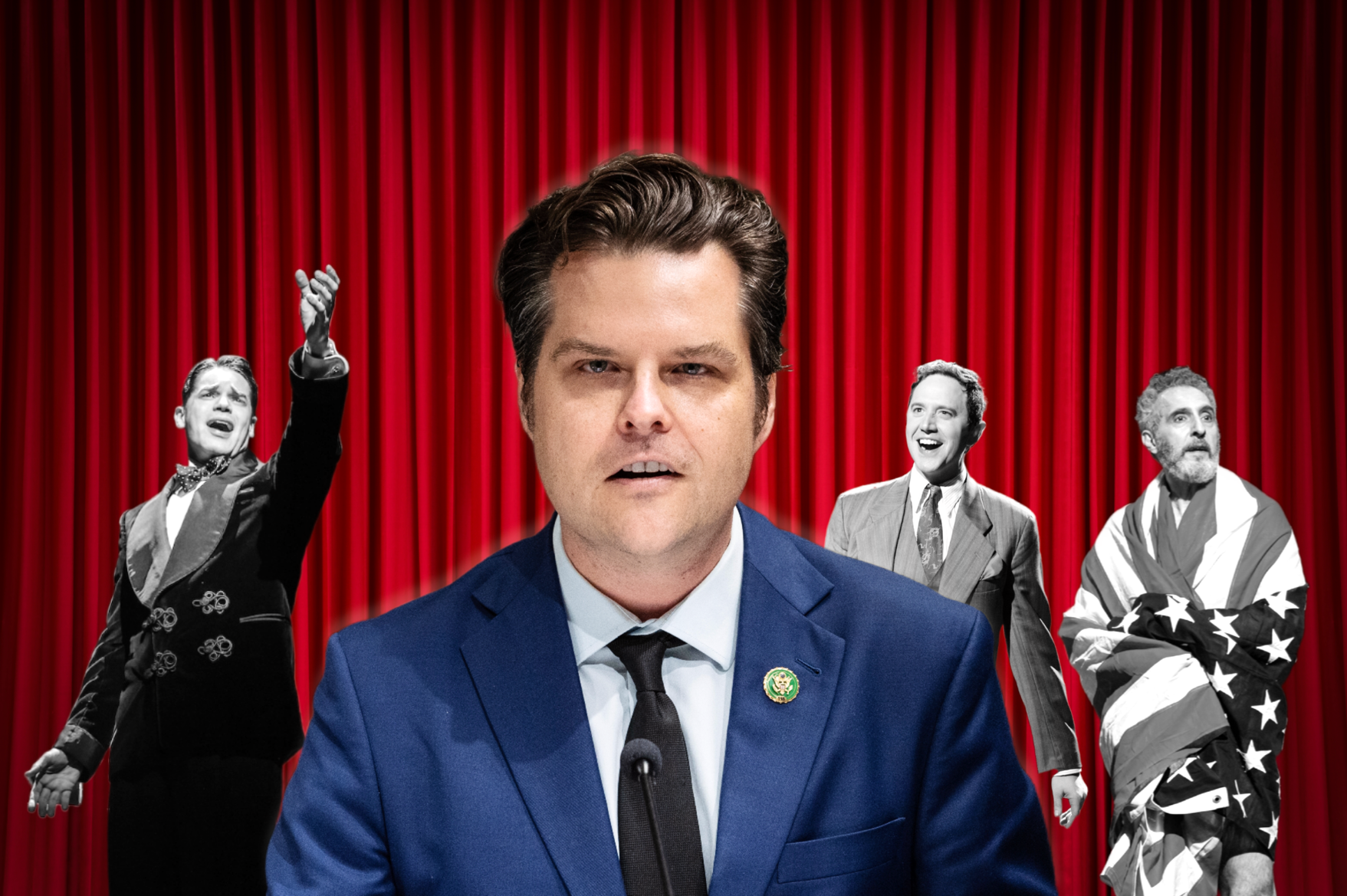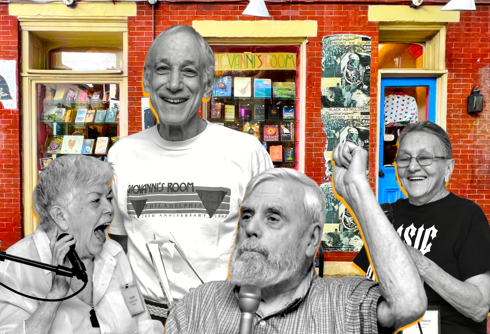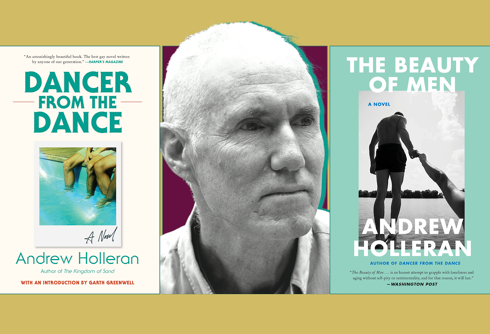“Haters gonna hate,” sings Taylor Swift in “Shake It Off.” But many of us can’t help gravitating toward the crazy, also known as modern times.
From Matt Gaetz’s (R-FL) podcast rants against fellow Republicans to his not-so-secret interest in becoming Florida’s next governor, rationally minded Americans’ eyes widen and glaze over with each new revelation. Social media makes it even more digestible to scroll through quick bites of insanity. However, the vitriol occasionally backfires, like that time Gaetz body-shamed a queer teen, and she flipped the script to raise more than $168,000 for women’s reproductive rights.
Even in our most progressive spaces (what could be more queer-inclusive than the theater?), a trio of new productions based on literary works puts problematic characters center stage. Audiences and critics have been mesmerized and confounded by these leading male anti-heroes as we collectively grapple with conscience and accountability — to our loved ones, our communities, and ultimately, to ourselves.
The not-so-great Gatsby
Dive deeper every day
Join our newsletter for thought-provoking commentary that goes beyond the surface of LGBTQ+ issues
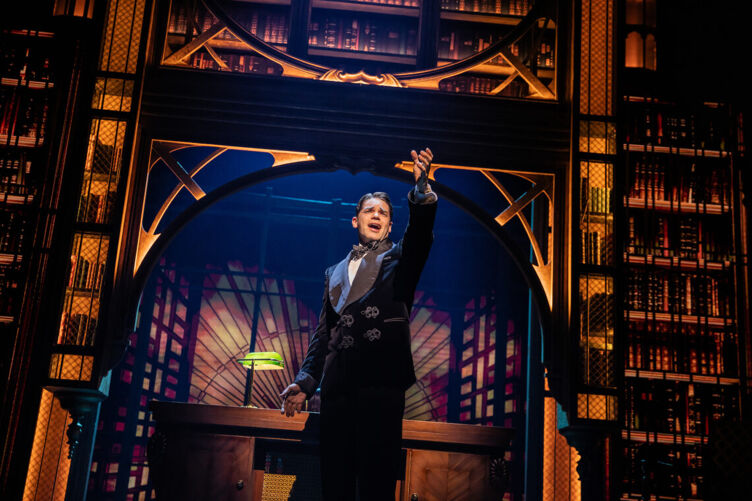
F. Scott Fitzgerald’s Jazz Age novel The Great Gatsby has received multiple film and stage adaptations, including Baz Luhrmann’s epic 2003 re-telling starring Leonardo DiCaprio in the title role. Paper Mill Playhouse, a regional theater just across the Hudson River and within striking distance of Broadway, is currently staging a new musical version with former Newsies star Jeremy Jordan as Jay Gatsby.
The overly earnest production sidesteps the undercurrent in Fitzgerald’s writing. The author once wrote to his agent, “I have never been able to forgive the rich for being rich, and it has colored my entire life and works.”
Gatsby’s mysterious wealth (much like Donald Trump’s, currently valued at $3.1 billion, despite the former president standing knee-deep in a civil fraud trial for allegedly inflating assets) allures the reader. Free-flowing champagne — illegal, it is Prohibition, after all — and a well-tailored suit can make its mark. The budding romance between Gatsby and socialite Daisy Buchanan (here played by Tony nominee Eva Noblezada) becomes palatable.
In the novel, Tom Buchanan’s racist rants provide enough reason for Daisy to bolt. Kait Kerrigan’s stage adaption eliminates this social commentary, though he is equally repulsive as an abusive cheater in this iteration. Still, the origin of the 1925 novel leaves little agency for Daisy, who opts to stay in a loveless marriage.
The tragic outcome, including a hit-and-run followed by a murder and death by suicide, makes the middle class look pretty damn good. That is if it still existed.
The Great Gatsby runs through November 12 at Paper Mill Playhouse.
Philp Roth’s sexually charged novel finds a new life onstage

Phillip Roth’s novel Sabbath’s Theater won the 1995 National Book Award despite a New York Times review that described the work as having “a static and claustrophobic air, resulting in a novel that’s sour instead of manic, nasty instead of funny, lugubrious instead of liberating.”
The story of Mickey Sabbath, an avant-garde puppeteer with a libido that borders on addiction, now takes to the stage in The New Group’s Off-Broadway production starring John Turturro (Barton Fink, Quiz Show).
Sabbath’s sexual compulsion, though heterosexual (a brilliant Elizabeth Marvel portrays his various partners), may ring true to a segment of gay men who have sought solace in sex. His brother’s death in World War II, his long-time lover’s cancer diagnosis, and a disillusionment of the American dream collide, leaving the aging Sabbath with a raging libido when a Lexapro prescription might be more effective.
In his book review, NPR’s Matthew Specktor wrote, “What’s most astonishing about Sabbath’s Theater is how powerfully tender it becomes, how its rage dissolves into love and its cruelty folds into humanity.” The play, directly lifted from Roth’s text by Turturro and New Yorker staff writer Ariel Levy, has one fatal flaw: We have to watch it.
The mind’s eye offers psychological respite from Roth’s more lurid passages. We can fast-track the title character as he masturbates on his mistress’s grave by quickly flipping the page. But watching that scene unfold in an intimate 200-seat Off-Broadway theater is, as the carriage driver says in The Wizard of Oz, a horse of a different color.
The line between sexual freedom, sexual promiscuity, and indecency shifts depending on who’s delivering the narrative. The far right would like to silo the LGBTQ+ community into a narrow definition of queer identity, primarily fueled by what body parts are going into what holes. Yet we can’t deny that sex is an integral part of queer life.
“Sex is a physical release [and] a way of forming community,” Michael Bronski, Harvard University’s Professor of the Practice in Media and Activism in Studies of Women, Gender, and Sexuality, told LGBTQ Nation. “It’s a way of meeting partners, whether a partner for 20 minutes, two months or for life.”
“It’s almost impossible to love Mickey Sabbath, and yet you do, even at his most appalling,” wrote Specktor of the novel. But when that behavior is center stage, love doesn’t come so easily.
Sabbath’s Theater runs through December 17 at The Pershing Square Signature Center.
‘You want a happy ending … pick up a fairy tale.’
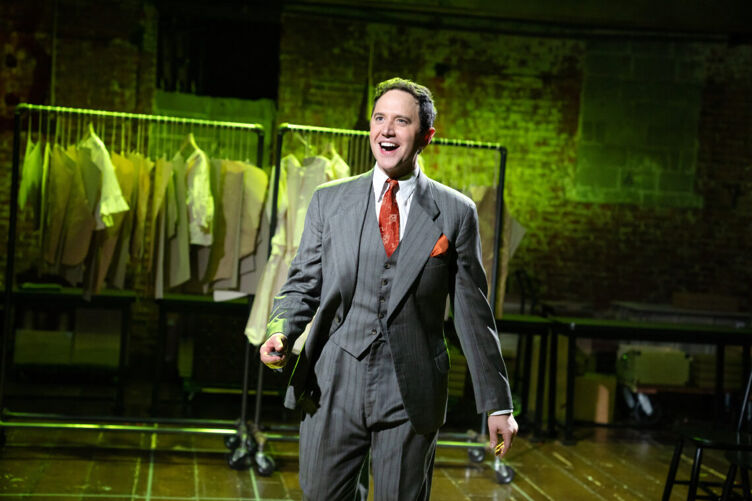
Twenty-four-year-old Jewish immigrant Jerome Weidman published I Can Get It for You Wholesale in 1937, inspired by his experience working in New York City’s harsh garment industry. Much like The Great Gatsby, Weidman’s debut novel delivered a critique of capitalism, though with different alterations.
In 1962, Weidman adapted the book into a musical, which featured music and lyrics by Harold Rome. But its biggest claim to fame was director Arthur Laurents’ discovery of a young Barbra Streisand (whose long-awaited memoir and self-narrated audiobook was just released). The musical starred Elliott Gould in the conniving role of Harry Bogen, a fast-talking garment district worker who evolves into a shady business owner who’d throw his business partner under the bus to save face (and jail time).
A rarely-seen revival at New York City’s Classic Stage Company revisits the work, including revisions to the book by Weidman’s son, John.
“Wholesale asks us both to watch charming cad Harry Bogen make some terrible choices and to consider what circumstances would lead him to make them in the first place. As we view this story from the safe distance of many decades, we may be tempted to push Harry away, comfortably saying, ‘I would never do that!’” writes producing artistic director Jill Rafson.
“But I ask you to push through that distance,” Rafson continues, “Find your way to the Harry who grew up poor and Jewish in the Great Depression, and meet him in our story in 1937 with a bit of openness as he maneuvers through the challenges of the world that has shaped him. ‘Would I do that?’”
It’s not a far leap to today’s headlines, where congressman George Santos (R-NY) sprints daily to outrun his lies, occasionally admitting to the ones he can’t talk himself out of.
Near Wholesale’s final moments, a battered Bogen (played by a captivating Santino Fontana) addresses the audience: “Hang on a minute, that’s it? We’re done? I thought the bad guy was supposed to get it in the end? Or maybe I was supposed to see the light and make everything OK. You want a happy ending… pick up a fairytale.”
Happy is relative these days. Survival seems like a more realistic goal as the polls swing toward Trump and wars rage on in Ukraine and the Middle East. There’s still plenty of fantasy on Broadway: Aladdin rubs his magic lamp eight times per week, while & Juliet reconsiders Shakespeare through a feminist and gender-inclusive lens.
Do we need a trifecta of cis men taking to the stage to blunder their way through life with a sense of unabashed entitlement? Maybe not — isn’t that what Congress is for? Art can effect change. But only if our response evolves into action beyond the safety of the theater.
I Can Get It for You Wholesale runs through December 17 at Classic Stage Company.
Featured image illustration by Matthew Wexler. (From left) Jeremy Jordan, photo by Evan Zimmerman for MurphyMade; Matt Gaetz, photo courtesy of Shutterstock; Santino Fontana, photo by Julieta Cervantes; John Turturro, photo by Monique Carboni.
Related:
3 implications of book banning and the power of diverse literature
Explore the concerning trend of book banning, particularly targeting diverse and LGBTQ+-related literature, and its potential impact on society.



